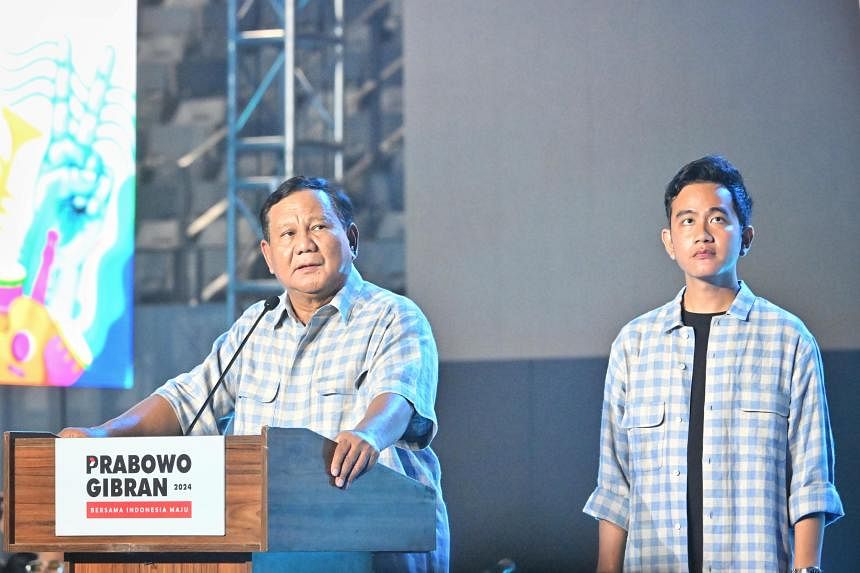JAKARTA – Mr Prabowo Subianto has won the Feb 14 Indonesian presidential election by a landslide, official results show, signalling continuity in government policy when his popular predecessor, Mr Joko Widodo, steps down in October after a decade in power.
The formal count by the General Elections Commission (KPU), announced on March 20, showed Mr Prabowo and his running mate Gibran Rakabuming Raka, son of President Widodo, had won 96,214,691 votes, representing 58.59 per cent of the total ballots cast.
Their opponents – former Jakarta governor Anies Baswedan and his running mate, veteran politician Muhaimin Iskandar – garnered 40,971,906 votes, or 24.95 per cent of the vote share, while former Central Java governor Ganjar Pranowo, who paired with former chief law and security minister Mahfud MD, received 27,040,878 votes, or 16.47 per cent.
The results did not differ significantly from the unofficial quick counts by pollsters, which predicted on election day that the Prabowo-Gibran team would secure nearly 60 per cent of the total votes.
The pair also won in 36 of 38 provinces, securing between 41 per cent and 75 per cent of the votes in each. They lost to the Anies-Muhaimin team in Aceh and West Sumatra provinces.
They also won 63.7 per cent of the overseas votes, drawn from 128 foreign election committees.
With the results, Mr Prabowo, 72, and Mr Gibran, 36, have fulfilled the necessary conditions to be formally elected under Indonesian law. It stipulates that a winning team must secure more than 50 per cent of the overall vote, and at least 20 per cent of the vote in half of the provinces. They will be sworn in on Oct 20.
In the legislative election that was also held on Feb 14, the Indonesian Democratic Party of Struggle (PDI-P) maintained its top spot, winning 16.72 per cent of the total votes, followed by Golkar with 15.29 per cent, and Mr Prabowo’s Gerindra party with 13.22 per cent.
The PDI-P, which had backed Mr Ganjar and is currently one of the parties in Mr Widodo’s coalition government, has hinted it may become the opposition voice in Parliament when the new government is formed later in 2024.
As the biggest party by the number of votes in Parliament for the next five years, the PDI-P could pose a challenge to the governing alliance of parties supporting the new president, should it go ahead with the plan, analysts have said.
Both Mr Widodo and Mr Gibran are currently members of PDI-P, but their ties with the party soured in the run-up to the election over differences in candidate choices.
Mr Prabowo has said that he would support Mr Widodo’s legacy projects, from downstreaming policies to prioritise processing of natural commodities such as nickel onshore, to developing the new administrative capital known as Nusantara in East Kalimantan.
The presidential race was important as it marked the first leadership change in a decade in the world’s third-largest democracy. Mr Widodo, 62, was constitutionally barred from running again after two terms in power.
For Mr Prabowo, who is currently defence minister, the victory was a long time coming after he was defeated twice by the immensely popular Mr Widodo in 2014 and 2019. His foe-turned-friend had campaigned for him this time.
The election largely proceeded smoothly, as candidates debated bread-and-butter issues, including jobs and inflation, to win the hearts of the electorate – 52 per cent of whom are under 40 years of age.
However, the campaigning was marred by controversies surrounding Mr Gibran’s candidacy and accusations that Mr Widodo was plotting to build a political dynasty.
At 36 years old, Mr Gibran originally did not meet the minimum 40-year-old age requirement for presidential and vice-presidential candidates.
But a Constitutional Court then presided by Chief Justice Anwar Usman, who is his uncle and Mr Widodo’s brother-in-law, ruled in October that candidates could run if they had previously been elected as regional leaders. Mr Gibran, the current mayor of Solo, thus qualified.
The Chief Justice was subsequently removed by an ethics panel for failing to recuse himself and for making last-minute changes to the election candidacy requirements.
The losing candidates are expected to challenge the election results at the Constitutional Court, citing widespread fraud and questions over the legitimacy of the outcome. The court will open submission for any electoral disputes for three days until March 23.
Mr Ganjar’s lawyer, Mr Todung Mulya Lubis, had said in mid-March that successfully challenging an election result with such a wide margin of victory will be difficult. Still, he questioned the irregularities during the election process, including Mr Gibran’s candidacy.
Meanwhile, Mr Anies had criticised what he said was a lack of state neutrality, citing irregularities such as the government’s massive distribution of social assistance in key electoral regions such as Central Java.
Political parties supporting the two defeated candidates have also discussed launching a parliamentary inquiry, known as hak angket, into the government’s conduct in the lead-up to voting day and alleged election violations.
Though the Constitutional Court typically handles election disputes, Indonesia’s Parliament has the power to investigate government policy or implementation of certain regulations, and can examine the conduct of public officials, including the president.
In past weeks, several protests have been staged outside the KPU in downtown Jakarta by various groups demanding that the elections commission, as well as the Elections Supervisory Agency (Bawaslu), investigate electoral fraud.
One group of demonstrators has been protesting outside the KPU office and in front of the House of Representatives complex since March 18, demanding, among other things, that the President step down over claims that he had shown partiality towards Mr Prabowo and Mr Gibran.
In the 2019 presidential election, Mr Prabowo had refused to accept his defeat to Mr Widodo, leading to violent protests that left eight people dead and hundreds injured. The Constitutional Court had rejected Mr Prabowo’s attempt to reverse the results and dismissed his claims of widespread fraud as groundless.


